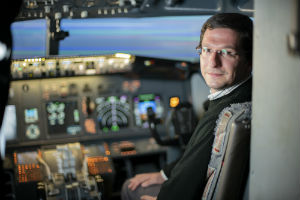Turbulence forecasting research puts Reading scientist in running for NERC award
21 November 2018

A University of Reading scientist whose research has helped keep billions of airline passengers safe has been shortlisted for a NERC Impact Award.
Professor Paul Williams' air turbulence forecasting algorithm looks at gravity waves in the atmosphere to allow airlines to predict when flights will be affected by turbulence. It has been used every day by the US National Weather Service since 2015 to allow the aviation sector to plot safer flight routes. These low turbulence routes are also helping to make flying greener by reducing CO2 emissions.
Professor Williams, from the University of Reading's Department of Meteorology and the NERC National Centre for Atmospheric Science (NCAS), has shown through his research that severe clear air turbulence is set to increase in the future due to climate change. This type of turbulence is invisible and can be strong enough to catapult passengers out of their seats.
Watch a video explaining Professor Williams' research >>>
Professor Williams’ research has been shortlisted for the societal category of the 2018 NERC Impact Awards.
'Unpleasant, distressing and dangerous'
Professor Williams said: "Turbulence is unpleasant to fly through and can be very distressing for nervous fliers. In severe cases, it can be dangerous, and we know it will become worse over the coming decades as the global climate warms.
"By developing better turbulence forecasting methods, and working with Airbus to ensure future aircraft design is informed by our climate change turbulence projections, we should have safer skies and help pilots avoid things that go bump in the flight."
"By developing better turbulence forecasting methods, we should have safer skies and help pilots avoid things that go bump in the flight" - Professor Paul Williams, University of Reading
Tens of thousands of planes encounter severe turbulence every year, with an estimated cost to the global aviation sector of around a billion dollars annually through injuries to cabin crew and passengers as well as structural damage to aircraft. Since 2015, it is estimated that 2.5 billion passengers have benefitted from the turbulence forecasts.
Professor Williams has also been working with aircraft engineers at Airbus to make sure that the next generation of planes is fit for a warmer and bumpier airspace.
Anaïs Mermet from Airbus said: “Professor Williams’ research has been a true motivation for Airbus to work on an automated turbulence-reporting function. We consider that his assessment of the evolution of turbulence phenomena in the future is a key point to demonstrate the interest of such a function.
“The research has contributed to increase Airbus’ understanding of the impacts that climate change may have on aircraft operations. Although much remains to be studied, it is key to anticipate as much as possible, notably through knowledge exchange between science and industry.”
The forecasting algorythm was developed by Professor Williams and a team comprising Professor John Knox from University of Georgia, USA, and Don McCann from McCann Aviation Weather Research Inc, USA.
"Professor Williams met a challenge that was thought to be intractable and tackled it head on" - Ned Garnett, NERC
NERC Associate Director of Research Ned Garnett said: “Professor Williams met a challenge that was thought to be intractable – predicting air turbulence – and tackled it head on, coming up with a theory, proving it, and having it adopted as an industry standard.
“The NERC Impact Awards recognise the impact that environmental research has had on society and the economy. Together with his team, Professor Williams has already improved the safety of flying in the North American airspace, and with plans to roll out their algorithm globally, air passengers look set to benefit the world over.”
Phil Newton, Research Dean for Environment at the University of Reading, said: "I am delighted that Paul's research has been shortlisted for a NERC Impact Award. The use by airlines of the turbulence forecasts that Paul's research enables is a considerable achievement already affecting routing decisions as well as comfort and safety for 2.5 million passengers every day. It is also helping to make flying greener by reducing the aviation industry's CO2 emissions. Yet more exciting is Paul's ambition to develop the impact further, into the realms of influencing aviation industry policy and aircraft design."
Impact awards
The NERC 2018 Impact Awards were created by NERC (Natural Environment Research Council) and seek to celebrate and reward NERC-funded researchers, as individuals or teams, whose work has had substantial impact on the economy and society either in the UK or abroad.
The categories for this year's awards are: early career impact, economic impact and societal impact.
This year's judges include former UK Environment Secretary Lord Deben, Chairman of the Committee on Climate Change, and BBC presenter and Professor of Public Engagement in Science Professor Alice Roberts.
The winners will be announced at a ceremony at the Natural History Museum on 3 December 2018.
